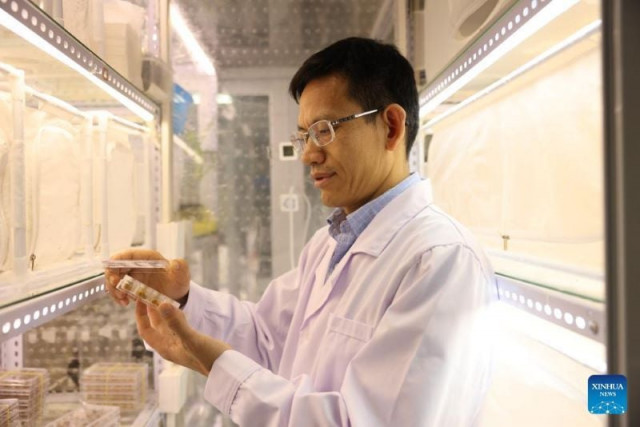Scientists in China unlock insect smell secrets for safe pesticides
Insect olfactory coding mechanism research, expected to give rise to a batch of green pesticides

Chinese scientists have published new research describing the olfactory mechanism of insects and how exposure to certain chemicals results in particular insect behaviors, providing ground-breaking information of use in developing environment-friendly, safe and efficient pesticides.
The research team was led by Wang Guirong, a researcher at the Agricultural Genomics Institute at Shenzhen under the Chinese Academy of Agricultural Sciences (CAAS), along with scientists from Huazhong Agricultural University and the Institute of Plant Protection under the CAAS. The research paper was published online in the latest issue of the academic journal Science.
According to Wang, insects rely on their sensitive sense of smell to perceive semiochemicals in the environment -- meaning chemicals emitted by organisms to trigger a response. Odorant receptors play a core role in the process of olfactory recognition, and when activated, they can convert external chemical signals into bioelectrical signals, thereby mediating the corresponding behavioral responses of insects, said Wang.
Among the various odorant receptors is that for alarm pheromones. Scientists have found that most aphids release small droplets containing the alarm pheromone from abdominal tubes when attacked by natural enemies or other dangers, warning neighboring aphids to quickly escape, Wang said.
By using cryoelectron microscopy technology, Wang's team studied the structure of the alarm pheromone receptors in pea aphids, and successfully revealed a mechanism by which aphids recognize alarm pheromones, providing a new perspective for understanding the interactions between insects.
Wang said that this discovery has both scientific significance and practical application value, providing theoretical support and practical guidance for the development of environment-friendly technologies to prevent and control aphids.
Bill Hansson, a scientist with the Max Planck Institute for Chemical Ecology in Germany and a foreign member of the Chinese Academy of Sciences (CAS), commented, "This knowledge is significant, as we still do not fully understand how odorant receptors detect molecules in any organism. Additionally, their study focused on aphids, a crucial agricultural pest, suggesting that this knowledge could be used to manage these insects in agriculture."
Read:Agri-revolution via China’s expertise
Meanwhile, Kang Le, an academician with the CAS, said, "This milestone breakthrough will effectively promote the research and development process of new green pest-control products, providing strong support for achieving a safe, green and sustainable agricultural production model."
According to Song Bao'an, an academician with the Chinese Academy of Engineering, this is a major breakthrough in the field of insect olfactory coding mechanism research, and is expected to give rise to a batch of green and efficient new products for insect behavior regulation.



















COMMENTS
Comments are moderated and generally will be posted if they are on-topic and not abusive.
For more information, please see our Comments FAQ